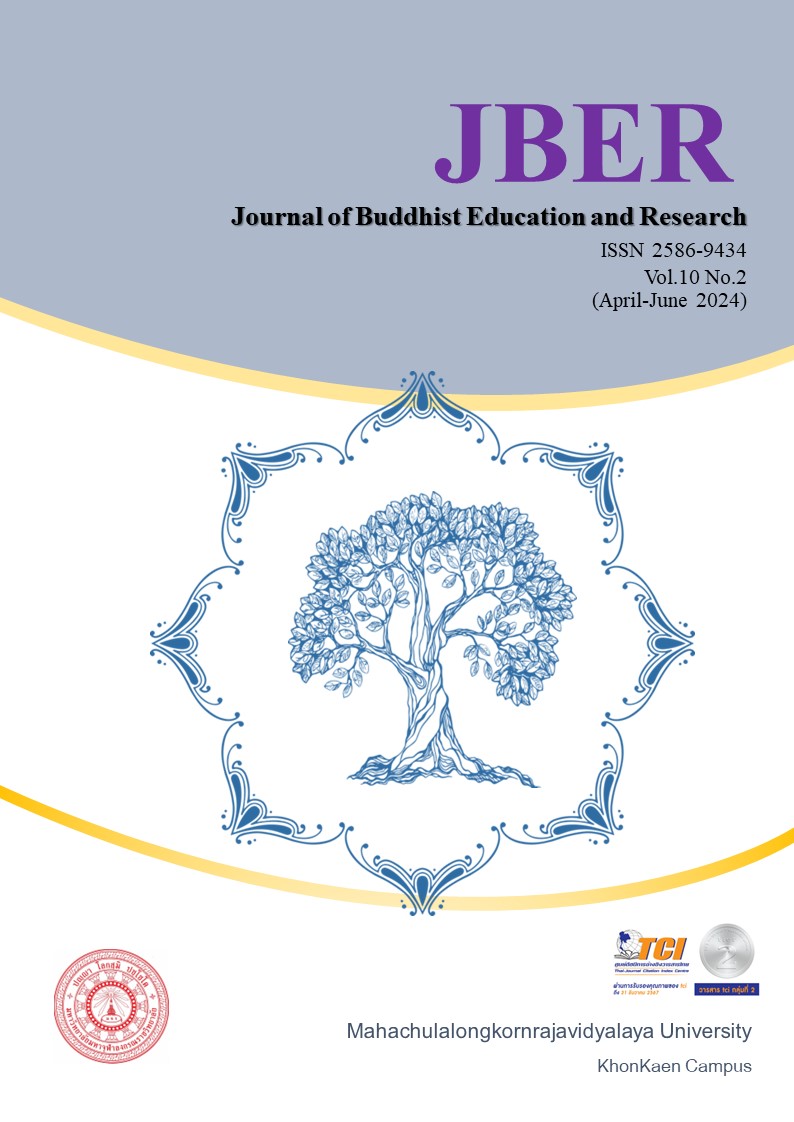THE DEVELOPMENT OF LEARNING SKILLS EXERCISES FOR THE BUDDHISM SUBJECT USING THE FLIPPED CLASSROOM MODEL FOR GRADE 6 PRIMARY SCHOOL STUDENTS AT THE BURAPHA NETWORK CENTER, THE OFFICE OF KHON KAEN PRIMARY EDUCATIONAL SERVICE AREA 5, KHON KAEN PROVINCE
Keywords:
The Development of Learning Skill Exercises, The Buddhism Subject, Flipped ClassroomAbstract
This research aimed to: 1. study the conditions and approaches to learning management; 2. develop learning skills exercises for the Buddhism subject; 3. compare the academic achievement of students before and after studying; 4. examine the satisfaction with the use of learning skills exercises for the Buddhism subject using the Flipped Classroom model at the Burapha Network Center, the Office of Khon Kaen Primary Educational Service Area 5, Khon Kaen Province. The experimental group comprised 24 grade 6 primary school students at Nong Hoi Thep Thewan School, Chorakae Subdistrict, Nong Ruea District, Khon Kaen Province, obtained through simple random sampling. The tools used in this study included (1) a questionnaire on learning management conditions, (2) an interview form on learning management conditions and approaches, (3) a learning skills exercise for the Buddhism subject, (4) a lesson plan for the Buddhism subject, (5) a pre-study and post-study achievement test for the Buddhism course, and (6) a student satisfaction questionnaire. The statistics used for data analysis included mean ( ), standard deviation (S.D.), dependent sample t-tests, statistical significance at the 0.05 level, and efficiency values (E1/E2) using ready-made statistical analysis software.
The research results were as follows: 1. The conditions and approaches to learning management for the Buddhism subject for grade 6 primary school students at the Burapha Network Center, Khon Kaen Primary Educational Service Area Office 5, Khon Kaen Province, were generally at a high level. 2. The results of developing learning skills exercises for the Buddhism subject using the Flipped Classroom model at the Burapha Network Center, the Office of Khon Kaen Primary Educational Service Area 5, Khon Kaen Province, showed an efficiency (E1/E2) of 88.85/83.3. 3. Academic achievement before and after studying revealed a significant difference, with a mean score of 13.24 before and 28.82 after studying, with statistical significance at the 0.05 level. 4. Satisfaction with the use of learning skills exercises for the Buddhism subject using the Flipped Classroom model at the Burapha Network Center, the Office of Khon Kaen Primary Educational Service Area 5, Khon Kaen Province, was generally at a very high level.
References
กระทรวงศึกษาธิการ. (2546). พระราชบัญญัติการศึกษาแห่งชาติ พ.ศ. 2542 ฉบับที่ 2 แก้ไขเพิ่มเติม พ.ศ. 2545. กรุงเทพมหานคร: โรงพิมพ์ชุมนุมสหกรณ์การเกษตรแห่งประเทศไทย จำกัด.
________. (2553). หลักสูตรแกนกลางการศึกษาขั้นพื้นฐาน พุทธศักราช 2551. พิมพ์ครั้งที่ 3.กรุงเทพมหานคร: โรงพิมพ์ชุมนุมสหกรณ์การเกษตรแห่งประเทศไทย จำกัด.
ขวัญจิตร วิรัตน์จันทร์. (2562). การพัฒนาผลสัมฤทธิ์ทางการเรียนวิชาสังคมศึกษา ศาสนาและวัฒนธรรมสาระภูมิศาสตร์ ของนักเรียนชั้นประถมศึกษาปีที่ 3/3 โรงเรียนวัดผาสุกมณีจักร โดยใช้ แบบฝึก ทักษะทางการเรียน. รายงานการวิจัย, โรงเรียนวัดผาสุกมณีจักร.
ทิชานนท์ ชุมแวงวาปีและลัดดา ศิลาน้อย. (2558). การพัฒนาผลสัมฤทธิ์ทางการเรียนและทักษะการแก้ปัญหา ด้วยวิธีการเรียนรู้โดยใช้ปัญหาเป็นฐานร่วมกับเทคนิคห้องเรียนกลับด้านของนักเรียนชั้นมัธยมศึกษา ปีที่ 1 ในรายวิชาสังคมศึกษาส 21103. วารสารศึกษาศาสตร์มหาวิทยาลัยขอนแก่น, 38(4), 7.
นครรัฐ โชติพรม และคณะ. (2562). การพัฒนาทักษะการคิด แบบโยนิโสมนสิการ ในรายวิชาพระพุทธศาสนาสำหรับนักเรียนชั้นมัธยมศึกษาปีที่ 6. วไลยอลงกรณ์ปริทัศน์ มหาวิทยาลัยราชภัฏ;ไลอลงกรณ์,9(2), 108-120.
ลำยง เครือคำ. (2555). การพัฒนาแบบฝึกทักษะการเขียนเรียงความโดยใช้แผนที่ความคิด สำหรับนักเรียนชั้นมัธยมศึกษาปีที่ 2. รายงานการวิจัย. มหาวิทยาลัยราชภัฏบุรีรัมย์.
Downloads
Published
How to Cite
Issue
Section
License

This work is licensed under a Creative Commons Attribution-NonCommercial-NoDerivatives 4.0 International License.





